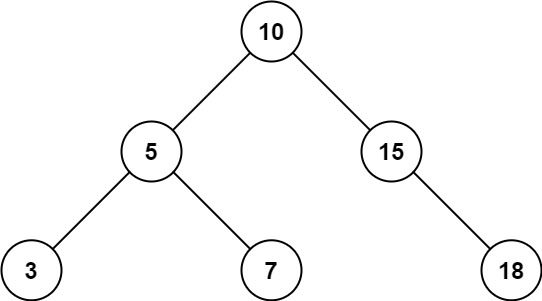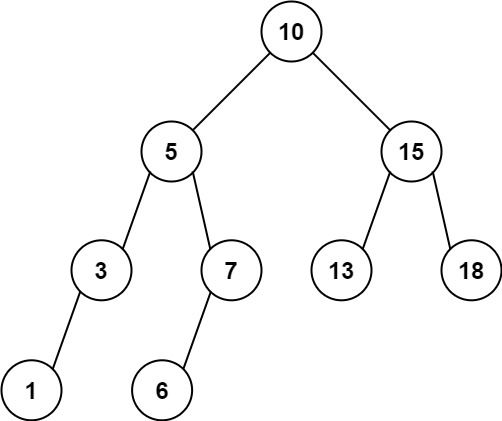Given the root node of a binary search tree, return the sum of values of all nodes with a value in the range [low, high].
Example 1:
Input: root = [10,5,15,3,7,null,18], low = 7, high = 15 Output: 32
Example 2:
Input: root = [10,5,15,3,7,13,18,1,null,6], low = 6, high = 10 Output: 23
Constraints:
- The number of nodes in the tree is in the range
[1, 2 * 104]. 1 <= Node.val <= 1051 <= low <= high <= 105- All
Node.valare unique.
# Definition for a binary tree node.
# class TreeNode:
# def __init__(self, val=0, left=None, right=None):
# self.val = val
# self.left = left
# self.right = right
class Solution:
def rangeSumBST(self, root: TreeNode, low: int, high: int) -> int:
def search(node):
if not node:
return
if low <= node.val <= high:
self.ans += node.val
search(node.left)
search(node.right)
elif node.val < low:
search(node.right)
elif node.val > high:
search(node.left)
self.ans = 0
search(root)
return self.ans/**
* Definition for a binary tree node.
* public class TreeNode {
* int val;
* TreeNode left;
* TreeNode right;
* TreeNode() {}
* TreeNode(int val) { this.val = val; }
* TreeNode(int val, TreeNode left, TreeNode right) {
* this.val = val;
* this.left = left;
* this.right = right;
* }
* }
*/
class Solution {
public int rangeSumBST(TreeNode root, int low, int high) {
if (root == null) {
return 0;
}
if (low <= root.val && root.val <= high) {
return root.val + rangeSumBST(root.left, low, high) + rangeSumBST(root.right, low, high);
} else if (root.val < low) {
return rangeSumBST(root.right, low, high);
} else {
return rangeSumBST(root.left, low, high);
}
}
}/**
* Definition for a binary tree node.
* struct TreeNode {
* int val;
* TreeNode *left;
* TreeNode *right;
* TreeNode() : val(0), left(nullptr), right(nullptr) {}
* TreeNode(int x) : val(x), left(nullptr), right(nullptr) {}
* TreeNode(int x, TreeNode *left, TreeNode *right) : val(x), left(left), right(right) {}
* };
*/
class Solution {
public:
int rangeSumBST(TreeNode* root, int low, int high) {
if (root == nullptr) return 0;
if (low <= root->val && root->val <= high) {
return root->val + rangeSumBST(root->left, low, high) + rangeSumBST(root->right, low, high);
} else if (root->val < low) {
return rangeSumBST(root->right, low, high);
} else {
return rangeSumBST(root->left, low, high);
}
}
};/**
* Definition for a binary tree node.
* type TreeNode struct {
* Val int
* Left *TreeNode
* Right *TreeNode
* }
*/
func rangeSumBST(root *TreeNode, low int, high int) int {
if root == nil {
return 0
}
if low <= root.Val && root.Val <= high {
return root.Val + rangeSumBST(root.Left, low, high) + rangeSumBST(root.Right, low, high)
} else if root.Val < low {
return rangeSumBST(root.Right, low, high)
} else {
return rangeSumBST(root.Left, low, high)
}
}

